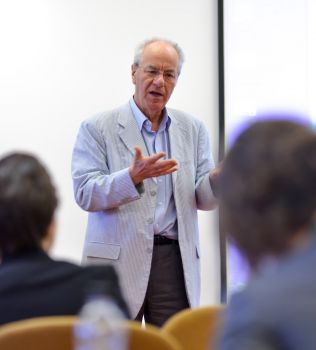Sussex experts analyse British Euroscepticism
Posted on behalf of: Sussex European Institute
Last updated: Friday, 21 June 2013

Peter Kellner, head of the YouGov polling agency, gave the keynote address at an SEI workshop on Euroscepticism in June 2013.
Although opposition to European integration is considerably higher in the UK than in other EU states, it is also increasing across the continent, a workshop organised by the Sussex European Institute (SEI) has revealed.
The 40 participants at the workshop on campus on Thursday (20 June) analysed the state of Euroscepticism in the UK, the factors driving opposition to European integration, and how to re-connect the British public with the EU.
Delegates included leading academic specialists on Euroscepticism and British politics from Sussex and beyond, together with practitioners and policy makers including Peter Kellner (head of the YouGov polling agency), Stephen Booth (Sussex alumnus and head of research at the Open Europe think tank), and representatives from the Foreign and Commonwealth Office and House of Commons Foreign Affairs Committee.
A session on the party politics of British Euroscepticism was followed by a keynote address by Peter Kellner on the state of the British public on European integration.
The workshop concluded by analysing different possible strategies for re-connecting the British public with the EU, including the proposed referendum on continued UK membership.
The workshop discussion drew on insights from specialists at the SEI-based European Parties and Referendums Network (EPERN) to reveal that, although opposition to European integration is considerably higher in the UK than in other EU states, it is also increasing across the continent.
While Britain is distinctive in so far as the Conservatives are an unusual case of a major governing party that is openly Eurosceptic, analysis of the Labour party and even the Liberal Democrats revealed that they too are wary of supporting European integration too enthusiastically. Rather, there is a high level of consensus among the main parties about what Britain’s interests are in Europe - but disagreement about how best to pursue them.
However, while polling shows that a surprisingly large number of Conservative party members (not just voters) would consider voting for the United Kingdom Independence Party (UKIP), there were doubts as to the extent to which this would actually happen at the next general election, when voters will be choosing a government rather than expressing a mid-term protest vote.
There was disagreement among participants as to whether a referendum would settle the issue of Britain’s EU membership or if it would simply continue to recur.
SEI Co-Director Professor Aleks Szczerbiak commented: “The subject of this workshop was extremely topical following UKIP’s success in the recent British local elections and the fact that the European issue has moved right up the political agenda after David Cameron’s decision to re-negotiate the UK’s terms of EU membership and then to hold a referendum.
“This workshop was an excellent opportunity to draw on our network of leading academic and practitioner specialists to undertake rigorous analysis of a phenomenon that has been high on the political and media agenda for the last few months and is likely to remain so for the foreseeable future.”
The workshop was the latest in a series of European Commission-funded SEI seminars and conferences on the challenges and opportunities facing the EU.
These began in September 2012 with SEI’s 20th- anniversary conference, which included a keynote address by former Commission Vice-President Lord (Leon) Brittan of Spennithorne.
This was followed by seminars on the European economic crisis, migration in Europe and the European External Action Service; over the next few months, further workshops are planned on topics such as EU justice and home affairs and Germany and the Euro crisis.

